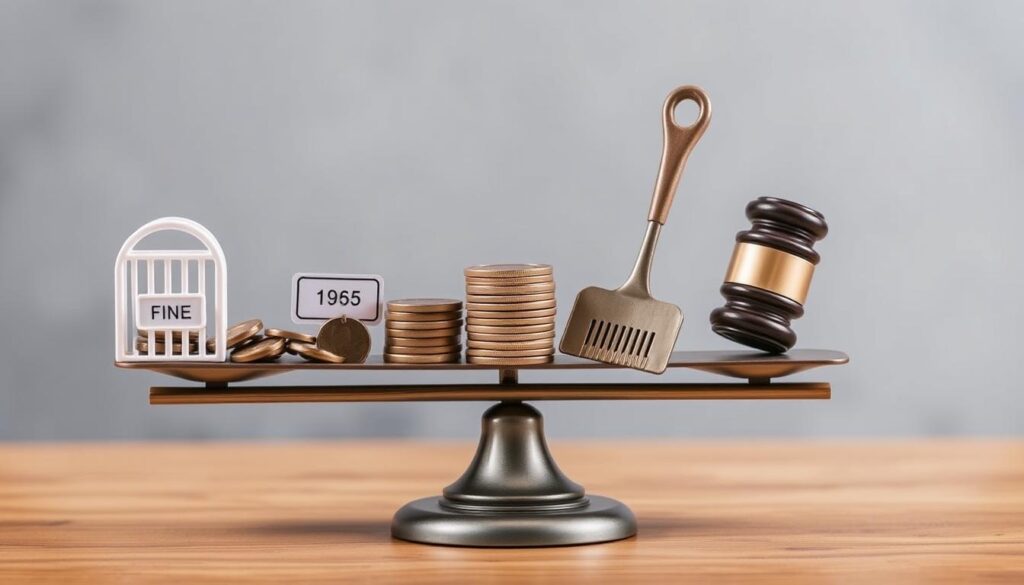Facing a first-time misdemeanor can be scary. These crimes are less serious than felonies but still have big consequences. In Texas, misdemeanors range from Class C to Class A, with different penalties and long-term effects. Knowing what your charge means and possible outcomes is key to deciding if you need a lawyer.
Misdemeanors cover a wide range of petty crimes and minor violations. These can include first-time DUIs, shoplifting, or small amounts of marijuana. Even though some might seem minor, the effects can be big, affecting jobs, homes, and your reputation.
In Texas, misdemeanor charges are serious. Class A misdemeanors, the most serious, can lead to up to 365 days in jail and fines up to $4,000. Even Class C misdemeanors, which don’t lead to jail, can still cause fines and a permanent criminal record. These outcomes show why getting legal advice is important, even for first-time offenders.
Key Takeaways
- Misdemeanors in Texas are classified as Class A, B, or C, with varying penalties
- Class A misdemeanors can lead to up to one year in jail and $4,000 in fines
- First-time offenders may be eligible for pretrial diversion programs
- A misdemeanor conviction can impact future employment and housing opportunities
- Legal representation can help navigate options like deferred adjudication
- Specialty courts in Texas offer alternative rehabilitation options for some offenders
Understanding Misdemeanor Classifications and Consequences
Misdemeanors are crimes that are more serious than infractions but less than felonies. They can lead to jail time of up to a year, fines, or community service. It’s important to know about misdemeanors if you’re facing charges.
Definition of Misdemeanor Offenses
A misdemeanor is a crime more serious than a summary offense but less than a felony. These crimes usually mean jail time of less than a year, fines, or both. Some places group misdemeanors into levels, with Class 1 or A being the most serious.
Common Types of Misdemeanor Charges
Misdemeanor charges include many offenses. These can be petty theft, disorderly conduct, simple assault, trespassing, and first-time DUI. Some places also see having small amounts of cannabis for personal use as a misdemeanor.
Difference Between Misdemeanors and Felonies
The main difference between misdemeanors and felonies is the punishment. Misdemeanors usually mean jail time of up to a year. Felonies mean more than a year in state prison. Felony convictions often have more serious long-term effects.
| Aspect | Misdemeanor | Felony |
|---|---|---|
| Maximum Jail Time | Up to 1 year | More than 1 year |
| Incarceration Location | County Jail | State Prison |
| Typical Offenses | Petty theft, simple assault | Robbery, aggravated assault |
| Impact on Rights | Limited | Significant (e.g., voting rights) |
First-Time Offender Programs and Legal Options
First-time offenders might get special help for petty or simple misdemeanors. These programs help avoid the usual criminal justice path. They are great for those facing their first legal issue.
Pre-Trial Diversion Programs
Pre-trial diversion programs offer a different way for those with low-level crimes. In California, they’re for some drug-related misdemeanors. Completing the program can wipe out the charges.
Eligibility Requirements
Who can join these programs varies by state and crime. In California, adults with drug-related misdemeanors might qualify. But, those with DUI, sex crimes, or violent offenses usually don’t.
First-time, minor crime offenders have the best shot at getting in. This is because they’re seen as less likely to reoffend.
Program Completion Benefits
Finishing a diversion program brings big advantages:
- Dismissal of charges
- No jail time
- Avoidance of a criminal record
- Better job chances
- More housing options
In California, you have a year to finish the program. You might do community service, treatment, or classes. If you succeed, your case gets dismissed. This lets you start fresh without a criminal record.
Potential Penalties Without Legal Representation
Dealing with a criminal offense without a lawyer can be very risky. In Massachusetts, crimes are split into Class A, B, and C. These include shoplifting, simple assault, and drug possession. Without a lawyer, the penalties can be very harsh.
Maximum Jail Time Possibilities
Prosecutors might ask for the toughest sentences if you don’t have a lawyer. This could mean jail time, even if it’s your first offense. The director of the Sixth Amendment Center says thousands face jail without a lawyer, showing the dangers of going it alone.
Financial Penalties and Fines
Misdemeanors often come with big fines. Without a lawyer to help, you might face the highest fines. This can be very hard, especially when you add other penalties of a conviction.

Long-term Record Implications
A misdemeanor conviction can affect you for a long time. It might hurt your job chances, where you can live, and government benefits. For non-citizens, some misdemeanor pleas could even mean deportation.
| Consequence | Without Legal Representation | With Legal Representation |
|---|---|---|
| Jail Time | Higher likelihood | Reduced possibility |
| Fines | Maximum penalties | Potential for reduction |
| Long-term Impact | Severe | Minimized |
Getting legal help, like from Rudolf, Smith, Griffis & Ruggieri, LLP, can greatly improve your chances. It’s important to know that the right to counsel only applies to crimes that could lead to jail. So, getting a lawyer for these charges is crucial.
How a Criminal Defense Attorney Can Help

A criminal defense attorney is key in misdemeanor cases. They help people facing charges understand the legal system. They work to get the best outcome for their clients.
Experienced lawyers offer many benefits:
- Legal advice on options and potential consequences
- Negotiation of plea deals
- Potential reduction or dismissal of charges
- Protection of client rights
- Guidance on expungement processes
In New York, misdemeanors have different penalties. For example, Class A misdemeanors can lead to up to a year in jail and fines of $1,000. A good attorney can help reduce these penalties and avoid mistakes.
Hiring a lawyer in Westchester County is especially helpful. Lawyers who used to be prosecutors know how the other side works. They have experience with many types of misdemeanors, like trespassing and DWI.
Getting a lawyer early can lead to better results. It can help avoid a criminal record and its effects on future chances.
Impact of Misdemeanor Conviction on Future Opportunities
A misdemeanor conviction can affect your future in big ways. Even a small offense can lead to big challenges in life.
Employment Consequences
Looking for a job gets harder with a misdemeanor on your record. Many employers check your background. This can stop you from getting jobs in healthcare, finance, and childcare.
Housing and Education Effects
Finding a place to live might be tough. Landlords often check your background. A misdemeanor could mean you won’t get a place to live.
Schools might also look at your record. This could limit your chances to go to college.
Professional License Implications
Some jobs need special licenses. A misdemeanor could stop you from getting or keeping these licenses. This is especially true for jobs like lawyers, teachers, and nurses.
The cost of a misdemeanor conviction can be high. You might have to pay hundreds or thousands of dollars in fines and court fees. Losing a job because of a misdemeanor can also hurt your finances for a long time.
Even a small offense can have big effects. It’s important to take any criminal charge seriously. Getting a lawyer can help protect your future.
Legal Defense Strategies for First-Time Offenders
First-time offenders have many legal defense strategies. These aim to lessen the impact of charges and protect their future.
One good strategy is to enter diversion programs. These programs let you avoid a conviction by meeting certain requirements. If you succeed, you can say you were never convicted.
Plea bargaining is also common. With a clean record, lawyers can ask for softer sentences. This might mean reduced charges or no conviction at all. It’s especially helpful in theft cases, where first-time offenders might get a break.
Challenging evidence or arrest methods can also work. The “beyond reasonable doubt” standard is high. Lawyers might question the arrest or police actions to build a strong case.
| Defense Strategy | Potential Outcome |
|---|---|
| Diversion Programs | Charge dismissal |
| Plea Bargaining | Reduced charges or withhold of adjudication |
| Evidence Challenge | Case dismissal or acquittal |
| Alternative Sentencing | Probation or community service instead of jail time |
For drug cases, drug court is a chance to avoid jail and formal conviction. It focuses on treatment over punishment. Having a skilled lawyer can greatly help first-time offenders in court.
Conclusion
Facing a first-time misdemeanor charge can feel overwhelming. But knowing the legal landscape is key. A petty crime might seem less serious than a felony. Yet, its effects can still be big.
Even a small violation can impact your job, home, and future chances. Legal help is essential for dealing with the justice system’s complexities. An experienced lawyer can look into options like pre-trial diversion programs for first-timers.
These programs might help avoid a conviction and lessen long-term effects. Remember, crimes are classified differently. Misdemeanors usually have lighter sentences than felonies. But, a conviction can still mean fines, jail, and a criminal record.
Getting professional legal advice can greatly change your case’s outcome. It might lower charges or find alternative sentences. Always take a minor violation seriously and get the right legal advice. Expert legal help is crucial, even for small offenses.
FAQ
What is a misdemeanor?
What are common types of misdemeanor charges?
How do misdemeanors differ from felonies?
What are pretrial diversion programs?
What are the potential penalties for a misdemeanor without legal representation?
How can a criminal defense attorney help with a misdemeanor case?
How can a misdemeanor conviction impact future opportunities?
What are some legal defense strategies for first-time offenders?
What is an ordinance violation?
What is the difference between a citation and a misdemeanor?
Source Links
- First Offense Texas – Penalties | The Napier Law Firm
- Do I Need a Lawyer to Fight a Class A Misdemeanor in Texas?
- Misdemeanor Crimes: Examples, Types, and Legal Implications
- Misdemeanor
- Misdemeanor Classifications and Penalties in Virginia
- California’s First Offender Programs – Law Offices Of Jerry Nicholson
- How California Law Treats First-time Offenders
- Diversion Programs – A Chance at a Fresh Start – Norcal Criminal Law
- Do I Need a Lawyer to Defend Against Misdemeanors in Massachusetts?
- The Challenges of Facing Misdemeanor Charges Without Legal Representation
- Cohen Forman Barone, P.C.
- Westchester Misdemeanor Attorney | Riebling & Payton, PLLC
- How a Criminal Law Attorney Can Help in Your Misdemeanor Case | Harris Guidi Rosner, P.A.
- Will a Misdemeanor Ruin My Life? Exploring the Long-term Consequences – Kirk Kirk Law
- Three Ways a Misdemeanor Can Impact Your Future
- 17 Best Criminal Defense Attorney Strategies: How Lawyers Win a Criminal Case
- FIRST TIME OFFENDERS – Criminal Defense Attorneys in Clearwater & St. Petersburg, FL | Pinellas County | The Law Office of Marc N. Pelletier
- Defending Against Theft Charges: Legal Options for First-Time Offenders
- Understanding Felony vs. Misdemeanor Charges in Terrell
- 7.10 Conclusion
